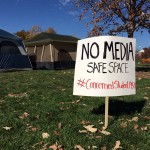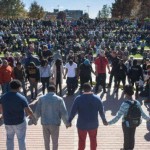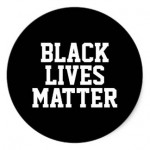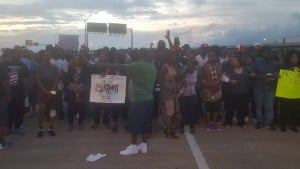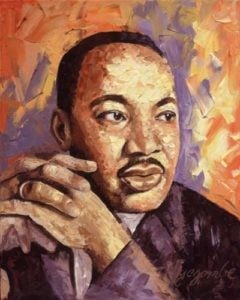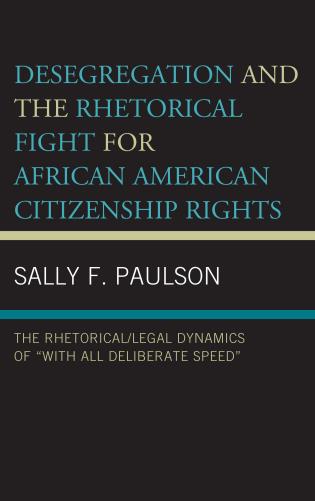The situation at the University of the Missouri is complicated, full of twists and turns and what feels like a constant stream of new information and misinformation. My own feeling of being overwhelmed by all of this information has been underscored by the near constant *ding* … *ding* … *ding* of iPhones and Facebook messages, as friends reach out to update me on the situation and check in to make sure I’m doing okay. While I feel a thousand miles removed from the situation and powerless to help, I’m very close to the events at Mizzou. Until six months ago, a saggy old house in downtown Columbia was my home and Switzler Hall, on the University of Missouri campus, was where I studied and worked. Dr. Melissa Click was my advisor, and throughout the exhausting process of completing my PhD, she offered not only an impressive level of knowledge and connectedness to the media studies field, but also support, guidance, empathy, and a spirit of generosity (of time, ideas, opportunities, emotional fortitude) that I will never be able to repay.
With my alma mater in crisis and my advisor the object of the internet rage machine, I have struggled to find words to describe the overwhelmingly complex systems of oppression, power, love, and hate at work in the stories that have flooded my mobile devices. As a scholar trained in words — both through my critical/cultural media studies doctoral work and my earlier background in rhetorical theory — I believe words are some of the most important parts of our world, not only in how they are used as rhetoric, but also in the way we can use them to find stronger, more nuanced perspectives on issues that may, on first glance, feel monolithic. The First Amendment is one of these issues, as is the divide our culture draws between public and private space. More obviously complex issues are at work here too, but even these only make sense through the words we choose. Is a professor’s responsibility to facilitate journalists’ unfettered access to a space, or is it to support and protect students who have called out for help both in that moment and for years before? In this moment, that depends upon whom you ask, but even that disagreement owes itself to the flood of words that have framed this issue in this (limited and often misinterpreted) context at this time.
In this discussion (though the rage and self-righteous dismissal that has permeated so many exchanges makes “discussion” a debatably inapplicable term), one word that has catapulted itself to prominence is “journalism.” Of course the word journalism often finds a happy traveling companion in the First Amendment, but many may not have realized prior to this incident the link between journalism and Mizzou. And many still do not realize that a faulty connection has been made between journalism and media studies, with so many, many misinformed statements of the irony of Dr. Click’s involvement in this issue, especially given her position as a media professor. “Hypocrisy!” they cry. But words have meanings, and in this case, they are being used to stir up the very worst of humanity. Indeed, this is precisely the kind of incident that all media studies and rhetorical scholars must involve ourselves with, because any time blanket assumptions are made and unchallenged, our job is to remind others that words are powerful, flexible, and rarely simple.
Dr. Click is not a journalism professor. She is a professor of critical/cultural media studies. Media Studies scholars — like Rhetorical scholars — have a very different investment in teaching and research about the role of the media in a democracy. Rather than teaching students how to collect and document stories for the media, we teach students to bring a critical eye to the stories others have produced. We interrogate structures of media not as a monolithic public good — though, at least in my class, we do discuss the role of media as public interest — but as a complex system of narratives layered over technologies, ideologies, economic interests, and cultural politics. We connect contemporary news media stories with the histories that bubble underneath the apparent objectivity of journalism, and we bring to light the ways different backgrounds and experiences seep into each of our narratives shattering the concept of neutrality. My classes examine the progressive role of alternative presses in labor movements alongside the racist media structures that paint Black men and boys as criminals, erase Black women victims of state violence, and somehow find more positive descriptions for White mass murders than for unarmed Black victims. My students discuss the fact that news media — like all institutions — is situated within a particular cultural context that does not particularly value the intellectual contributions of marginalized groups, and the ways marginalization is exaggerated by structures of advertising revenue that constrict both media’s stories and journalists themselves. And we talk about the ways limited numbers of Black characters narrow the possibilities for representation as part of a media system that can implicate individual journalists and media producers, but that is also much, much larger than any lone reporter.
I don’t teach journalism. I teach students to find a healthy position of media skepticism, not because I don’t respect the abstract and noble concept of journalism, but because I do. I believe media could serve the public interest, a concept that is not itself monolithic or easily defined, but I don’t believe it is doing so right now. It is the role of the scholar trained in words and symbols both to call attention to the snags in the fabric of media and cultural politics and to search for ways of improving these institutions. Our job is to find a place of productive opposition within the larger context of a media-infused culture. That necessarily means supporting some aspects of media practice and pushing back, challenging, and, yes, sometimes even protecting our students from the violence that words can do. As others have written, there were very good reasons Mizzou’s student protesters didn’t want to talk to the media at that moment. There are also very good reasons we might consider the use of public space to be more nuanced in cases of protest occupation, not that we don’t regularly place implicit restrictions on journalists in public spaces every single day. Offering context, challenging word choices, and interrogating cultural assumptions as these counter arguments do are not antithetical to understanding media institutions. These processes of media and rhetorical analysis go hand in hand with supporting media for the purpose of improving its service to the public interest.
Over the course of these events, many well-meaning people have proudly declared to me that they would never have asked journalists to leave, because they “know how media works.” I want to suggest that knowing how media works is an excellent reason to refuse participation in our current, economically-driven system of corporate and conglomerate media.
Amanda Nell Edgar is a Visiting Assistant Professor of Communication at the University of Memphis

